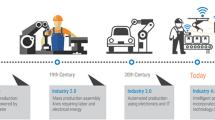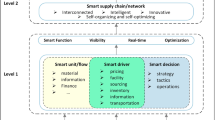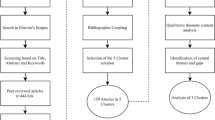Abstract
In this study, we analyse the value creation of Industry 4.0 (I40) technologies in flexible manufacturing (FM) under a sustainability perspective. I40 is a popular strategy that Western manufacturing organizations adopt to face competition from low-cost producers. Organizations adopting I40 use advanced digital technologies to make production processes more flexible and increasingly automated. Several pieces of evidence confirm how I40 leads to higher productivity and higher-quality products, improving the economic performance of organizations. However, increasing automation may also lead to the reduction of human labour in the production process, which may contribute to the disappearance of jobs, the reduction of expertise and the loss of know-how in manufacturing organizations. While the literature acknowledges the technical and economic advantages of I40, the sustainability of the value created through these technologies deserves further investigation. To address the gap, we complement the IT value theory with the concept of sustainability, including the three dimensions of economic, environmental and social sustainability. We perform a multiple case study analysis of four Italian manufacturing organizations that have successfully implemented I40 technologies in FM. The cases show that I40 technologies support sustainable organizational value when they are deployed with a worker-centric approach. In this condition, the organization leverages workforce activities to continuously fine-tune the technologies and to exploit the adaptive features of the technologies to continuously improve processes.

Similar content being viewed by others
Notes
Annual detailed enterprise statistics for industry (NACE Rev. 2, B-E): https://appsso.eurostat.ec.europa.eu/nui/show.do?dataset=sbs_na_ind_r2&lang=en, retrieved: 09/01/2020.
References
Aral, S., Brynjolfsson, E., & Van Alstyne, M. (2012). Information, technology, and information worker productivity. Information Systems Research, 23(3-part-2), 849–867. https://doi.org/10.1287/isre.1110.0408.
Barua, A., Kriebel, C. H., & Mukhopadhyay, T. (1995). Information technologies and business value: An analytic and empirical investigation. Information Systems Research, 6(1), 3–23. https://doi.org/10.1287/isre.6.1.3.
Bednar, P. M., & Welch, C. (2020). Socio-technical perspectives on smart working: Creating meaningful and sustainable systems. Information Systems Frontiers, 22(2), 281–298. https://doi.org/10.1007/s10796-019-09921-1.
Ben-Daya, M., Hassini, E., & Bahroun, Z. (2017). Internet of things and supply chain management: A literature review. International Journal of Production Research, 7543(November), 1–24. https://doi.org/10.1080/00207543.2017.1402140.
Bonekamp, L., & Sure, M. (2015). Consequences of Industry 4.0 on human labour and work organisation. Journal of Business and Media Psychology, 6(1), 33–40.
Braccini, A., & Margherita, E. (2019). Exploring organizational sustainability of Industry 4.0 under the triple bottom line: The case of a manufacturing company. Sustainability, 11(1), 36. https://doi.org/10.3390/su11010036.
Braccini, A. M. (2011). Value generation in organisations. Saarbrücken: LAMBERT Academic Publishing.
Bressanelli, G., Adrodegari, F., Perona, M., & Saccani, N. (2018). The role of digital technologies to overcome circular economy challenges in PSS business models: An exploratory case study. Procedia CIRP, 73, 216–221. https://doi.org/10.1016/j.procir.2018.03.322.
Cespedes-Lorente, J. J., Magan-Diaz, A., & Martinez-Ros, E. (2018). Information technologies and downsizing: Examining their impact on economic performance. Information & Management, 56(4), 526–535.
Corbin, J., & Strauss, A. (2015). Basics of qualitative research. techniques and procedures for developing grounded theory. Thousand Oaks: SAGE Publications Inc.
Denzin, N. (2006). Sociological methods: a sourcebook. Abingdon: Routledge.
Devaraj, S., & Kohli, R. (2003). Performance impacts of information technology: Is actual usage the missing link ? Management Science, 49(3), 273–289. https://doi.org/10.1287/mnsc.49.3.273.12736.
Eisenhardt, K. M. (1989). Building theories from case study research. Academy of Management Review, 14(4), 532–550.
Elkington, J. (1997). Cannibals with forks – Triple bottom line of 21st century business. Stoney Creek: New Society Publishers.
Fatorachian, H., & Kazemi, H. (2018). A critical investigation of Industry 4.0 in manufacturing: theoretical operationalisation framework. Production Planning and Control, 7287(January), 1–12. https://doi.org/10.1080/09537287.2018.1424960.
Frey, C. B., & Osborne, M. A. (2017). The future of employment: How susceptible are jobs to computerisation? Technological Forecasting and Social Change, 114, 254–280.
Gabriel, M., & Pessel, E. (2016). Industry 4.0 and sustainability impacts: Critical discussion of sustainability aspects with a special focus. ANNALS of Faculty Engineering Hunedoara – International Journal of Engineering, 14(2), 131–136.
Gregori, F., Papetti, A., Pandolfi, M., Peruzzini, M., & Germanu, M. (2018). Improving a production site from a social point of view: An IoT infrastructure to monitor workers condition. Procedia CIRP, 72, 886–891.
Grover, V., & Kohli, R. (2012). Cocreating IT value: New capabilities and metrics for multifirm environments. MIS Quarterly, 36(1), 225–232.
Günther, W. A., Mehrizi, R., Huysman, M. H., M., & Feldberg, F. (2017). Debating big data: A literature review on realizing value from big data. Journal of Strategic Information Systems, 26(3), 191–209. https://doi.org/10.1016/j.jsis.2017.07.003.
Hart, S. L., & Milstein, M. B. (2003). Creating sustainable value. Acedemy of Management Executive, 17(2), 56–67.
Herrmann, C., Schmidt, C., Kurle, D., Blume, S., & Thiede, S. (2014). Sustainability in manufacturing and factories of the future. International Journal of Precision Engineering and Manufacturing - Green Technology, 1(4), 283–292. https://doi.org/10.1007/s40684-014-0034-z.
Hertel, M., & Wiesent, J. (2013). Investments in information systems: A contribution towards sustainability. Information Systems Frontiers, 15(5), 815–829.
Im, K. S., Dow, K. E., & Grover, V. (2001). Research report: A reexamination of IT investments and the market value of the firm - An event study methodology. Information Systems Research, 12(1), 103–117.
Jayaprakash, P., & Pillai, R. (2019). The role of ICT for sustainable development: A cross country analysis. In Proceedings of the International Conference on Information Systems (ICIS 2019).
Kagermann, H., Wolfgang, W., & Helbig, J. (2013). Recommendations for implementing the strategic initiative INDUSTRIE 4.0. Working Group. Acatech, Frankfurt Am Main, Germany, (April), 82. https://doi.org/10.13140/RG.2.1.1205.8966.
Kamble, S. S., Gunasekaran, A., & Sharma, R. (2018). Analysis of the driving and dependence power of barriers to adopt industry 4.0 in Indian manufacturing industry. Computers in Industry, 101(June), 107–119. https://doi.org/10.1016/j.compind.2018.06.004.
Kang, H. S., Lee, J. Y., Choi, S., Kim, H., Park, J. H., Son, J. Y., … Noh, S., & Do (2016). Smart manufacturing: Past research, present findings, and future directions. International Journal of Precision Engineering and Manufacturing - Green Technology, 3(1), 111–128. https://doi.org/10.1007/s40684-016-0015-5.
Kembro, J. H., Danielsson, V., & Smajli, G. (2017). Network video technology: Exploring an innovative approach to improving warehouse operations. International Journal of Physical Distribution and Logistics Management, 47(7), 623–645. https://doi.org/10.1108/IJPDLM-02-2017-0112.
Kiel, D., Muller, J. M., Arnold, C., & Voigt, K. (2017). Sustainable industrial value creation: benefits and challenges of Industry 4.0. International Journal of Innovation Management, 21(8), 1740015.
Kohli, R., & Devaraj, S. (2003). Measuring information technology payoff: A meta-analysis of structural variables in firm-level empirical research. Information Systems Research, 14(2), 127–145. https://doi.org/10.1287/isre.14.2.127.16019.
Kohli, R., & Grover, V. (2008). Business value of IT: An essay on expanding research directions to keep up with the times. Journal of the Association for Information Systems, 9(1), 23–39.
Lasi, H., Fettke, P., Feld, T., & Hoffman, M. (2014). Industry 4.0. Business & Information Systems Engineering, 6(4), 239–242.
Lee, C. K. M., Lv, Y., Ng, K. K. H., Ho, W., & Choy, K. L. (2018). Design and application of Internet of things-based warehouse management system for smart logistics. International Journal of Production Research, 56(8), 2753–2768. https://doi.org/10.1080/00207543.2017.1394592.
Lee, J., Bagheri, B., & Kao, H. A. (2015). A cyber-physical systems architecture for industry 4.0-based manufacturing systems. Manufacturing Letters, 3, 18–23.
Lee, S., Yong, J., & Kim, J. K. (2011). Information & management information technology and productivity: Empirical evidence from the Chinese electronics industry. Information & Management, 48(2–3), 79–87. https://doi.org/10.1016/j.im.2011.01.003.
Lee, Y., Kim, J., Lee, H., & Moon, K. (2017). IoT-based data transmitting system using a UWB and RFID system in smart warehouse. In 2017 Ninth International Conference on Ubiquitous and Future Networks (ICUFN) (pp. 545–547). IEEE.
Leitao, P., Colombo, W. A., & Karnouskos, S. (2016). Industrial automation based on cyber-physical systems technologies: Prototype implementations and challenges. Computers in Industry, 81, 11–25.
Li, L. (2018). China’s manufacturing locus in 2025: With a comparison of “Made-in-China 2025” and “Industry 4.0.” Technological Forecasting and Social Change, 135(May 2017), 66–74. https://doi.org/10.1016/j.techfore.2017.05.028.
Liang, Y. C., Lu, X., Li, W. D., & Wang, S. (2018). Cyber physical system and big data enabled energy efficient machining optimisation. Journal of Cleaner Production, 187, 46–62. https://doi.org/10.1016/j.jclepro.2018.03.149.
Liao, Y., Deschamps, F., de Loures, E. F. R., & Ramos, L. F. P. (2017). Past, present and future of Industry 4.0 - A systematic literature review and research agenda proposal. International Journal of Production Research, 55(12), 3609–3629.
Littig, B., & Griessler, E. (2005). Social sustainability: A catchword between political pragmatism and social theory. International Journal of Sustainable Development, 8(1/2), 65. https://doi.org/10.1504/IJSD.2005.007375.
Liu, C., & Zhong, R. Y. (2017). Internet of things for manufacturing in the context of industry 4.0. Transdisciplinary Engineering: A Paradigm Shift, 5, 1013–1022. https://doi.org/10.3233/978-1-61499-779-5-1013.
Liu, Q., Li, H., Zuo, X., Zhang, F., & Wang, L. (2009). A survey and analysis on public awareness and performance for promoting circular economy in China: A case study from Tianjin. Journal of Cleaner Production, 17(2), 265–270. https://doi.org/10.1016/j.jclepro.2008.06.003.
Liu, Y., & Bai, Y. (2014). An exploration of firms’ awareness and behavior of developing circular economy: An empirical research in China. Resources, Conservation and Recycling, 87, 145–152. https://doi.org/10.1016/j.resconrec.2014.04.002.
Matt, C., Hess, T., & Benlian, A. (2015). Digital transformation strategies. Business and Information Systems Engineering, 57(5), 339–343. https://doi.org/10.1007/s12599-015-0401-5.
Melville, N., Kraemer, K. L., & Gurbaxani, V. (2004). Review - Information technology and organizational performance: An integrative model of IT business value. MIS Quarterly, 28(2), 283–322.
Mikalef, P., Pappas, I. O., Krogstie, J., & Pavlou, P. A. (2020). Big data and business analytics: A research agenda for realizing business value. Information and Management, 57(1). https://doi.org/10.1016/j.im.2019.103237.
Nicolescu, R., Huth, M., Radanliev, P., & De Roure, D. (2018). Mapping the values of IoT. Journal of Information Technology, 33(4), 345–360. https://doi.org/10.1057/s41265-018-0054-1.
Nurazwa, A., Seman, N. A. A., & Shamsuddin (2019). Industry 4.0 implications on human capital: A review. Journal for Studies in Management and Planning, 4(Special Issue-13), 221–235.
Pappas, I. O., Mikalef, P., Giannakos, M. N., Krogstie, J., & Lekakos, G. (2018). Big data and business analytics ecosystems: Paving the way towards digital transformation and sustainable societies. Information Systems and E-Business Management, 16(3), 479–491. https://doi.org/10.1007/s10257-018-0377-z.
Scheepers, H., & Scheepers, R. (2008). A process-focused decision framework for analyzing the business value potential of IT investments. Information Systems Frontiers, 10(3), 321–330. https://doi.org/10.1007/s10796-008-9076-5.
Schryen, G. (2013). Revisiting IS business value research: What we already know, what we still need to know, and how we can get there. European Journal of Information Systems, 22, 139–169. https://doi.org/10.1057/ejis.2012.45.
Schulze, C., Thiede, S., Thiede, B., Kurle, D., Blume, S., & Herrmann, C. (2018). Cooling tower management in manufacturing companies: A cyber-physical system approach. Journal of Cleaner Production, 211, 428–441.
Shang, S., & Seddon, P. B. (2000). A Comprehensive Framework for Classifying the Benefits of ERP Systems. Americas Conference on Information Systems, 39.
Shea, V. J., Dow, K. E., Chong, A. Y. L., & Ngai, E. W. T. (2019). An examination of the long-term business value of investments in information technology. Information Systems Frontiers, 21(1), 213–227. https://doi.org/10.1007/s10796-017-9735-5.
Stock, T., & Seliger, G. (2016). Opportunities of sustainable manufacturing in Industry 4.0. Procedia CIRP, 40(Icc), 536–541. https://doi.org/10.1016/j.procir.2016.01.129.
Thoben, K.-D., Wiesner, S., & Wuest, T. (2017). “Industrie 4.0” and smart manufacturing – A review of research issues and application examples. International Journal of Automation Technology, 11(1), 4–19. https://doi.org/10.20965/ijat.2017.p0004.
Trantopoulos, K., von Krogh, G., Wallin, M. W., & Woerter, M. (2017). External knowledge and information technology: Implications for process innovation performance. MIS Quarterly, 41(1), 287–300. https://doi.org/10.25300/MISQ/2017/41.1.15.
Wade, M., & Hulland, J. (2004). Review: The resource-based view and information systems research: review, extension, and suggestions for future research. MIS Quarterly, 28(1), 107–142.
Wagner, H.-T., & Weitzel, T. (2007). Towards an IT production function - Understanding routines as fundamental for IT value creation. Journal of Enterprise Information Management, 20(4), 380–395.
WCED. (1987). Our common future. Oxford: Oxford University Press.
Wright, S. A., & Schultz, A. E. (2018). The rising tide of artificial intelligence and business automation: Developing an ethical framework. Business Horizons, 61(6), 823–832.
Yin, R. K. (2018). Case study research and applications. Design and methods (6th ed.). Thousand Oaks: SAGE Publications Inc.
Yuan, Z., Qin, W., & Zhao, J. (2017). Smart manufacturing for the oil refining and petrochemical industry. Engineering, 3(2), 179–182.
Zhang, Y., Liu, S., Liu, Y., Yang, H., Li, M., Huisingh, D., & Wang, L. (2018). The ‘Internet of Things’ enabled real-time scheduling for remanufacturing of automobile engines. Journal of Cleaner Production, 185, 562–575. https://doi.org/10.1016/j.jclepro.2018.02.061.
Author information
Authors and Affiliations
Corresponding author
Additional information
Publisher's Note
Springer Nature remains neutral with regard to jurisdictional claims in published maps and institutional affiliations.
Rights and permissions
About this article
Cite this article
Margherita, E.G., Braccini, A.M. Industry 4.0 Technologies in Flexible Manufacturing for Sustainable Organizational Value: Reflections from a Multiple Case Study of Italian Manufacturers. Inf Syst Front 25, 995–1016 (2023). https://doi.org/10.1007/s10796-020-10047-y
Published:
Issue Date:
DOI: https://doi.org/10.1007/s10796-020-10047-y




